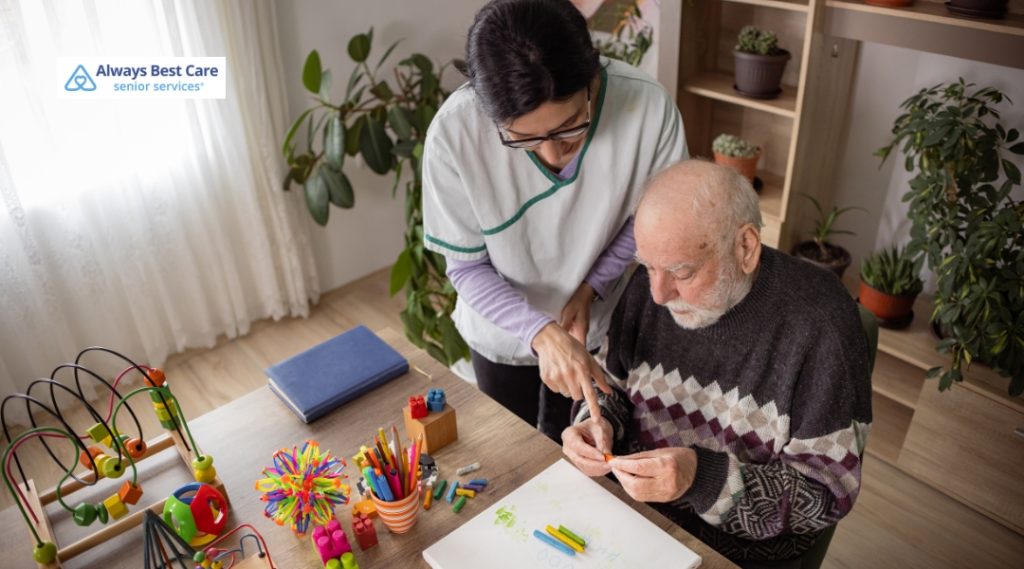Early Signs of Dementia You Shouldn’t Ignore in Irvine, CA

We all know that getting older brings some forgetfulness now and then — maybe misplacing the keys or blanking on a name.
But how do we tell when those little lapses might be something more?
Spotting the early signs of dementia is crucial for making sure our loved ones get the care they need before things take a serious turn.
At Always Best Care of Irvine, we want to help you recognize these subtle clues so you’re never caught off guard.
What you will learn:
- How to distinguish between normal age-related forgetfulness and the early signs of dementia.
- The most common early warning signs of dementia.
- The importance of early detection, the benefits of seeking help promptly, and how in-home care services can make a positive difference for individuals and families facing dementia.
Table of Contents
Normal Aging vs. Early Signs of Dementia: What’s the Difference?
Here’s the deal — not every memory slip means dementia is creeping in. Aging can slow us down, but most people stay sharp enough to handle day-to-day life without too much trouble.
Normal aging often looks like:
- Occasionally forgetting names or appointments, but recalling them later
- Taking longer to learn new things
- Minor difficulty multitasking
- Still managing finances, cooking, or driving safely
On the flip side, early dementia messes with much more than just memory; it starts chipping away at how well someone functions independently.
Early dementia signs that shouldn’t be brushed off include:
- Forgetting recently learned information repeatedly
- Struggling with tasks that were once done easily, like following a recipe
- Having trouble finding words or keeping up in conversations
- Making poor decisions that could harm their safety
- Getting confused about time or place—maybe even lost in familiar spots
When these patterns start showing up regularly, it’s a red flag waving loud and clear.

7 Key Early Signs of Dementia You Shouldn’t Brush Off
Let’s break down what usually raises eyebrows:
- Memory Loss That Gets In The Way: Forgetfulness is common, but when it disrupts everyday activities, like missing important appointments repeatedly, it signals trouble.
- Trouble Finishing Familiar Tasks: Cooking dinner? Balancing checkbooks? If these become puzzling puzzles overnight, don’t shrug them off.
- Struggling With Words & Conversations: Repeating yourself constantly or struggling to follow what others say may mean their brain isn’t keeping pace anymore.
- Questionable Judgment & Decisions: Giving away money foolishly or neglecting personal hygiene? Those aren’t simple quirks; they’re serious warning bells.
- Losing Track Of Time & Place: Suddenly confused about dates, seasons. Getting lost on routes they’ve driven for years?
- Mood Swings Or Personality Changes: Irritability outta nowhere, anxiety creeping in where there was none before — it might be their brain reacting differently as symptoms set in.
- Putting Things In Odd Places And Not Retracing Steps: Yes, who hasn’t misplaced keys under cushions? Sticking a TV remote into the freezer frequently isn’t typical aging behavior.
When Should We Step Up and Get Help?
If you see any one—or especially several—of these red flags piling up for your loved one around Irvine, don’t wait around twiddling your thumbs! An early chat with their doctor can confirm if this is normal aging…or something requiring extra care.
Early diagnosis gives families time, not just scrambling, to plan ahead thoughtfully rather than reacting during an emergency. Plus, options for treatment work best if started sooner rather than later.

How Can Always Best Care Make Life Easier?
Caring at home gets tricky fast once memory problems begin popping up regularly—that’s where we come into play here at Always Best Care of Irvine. Our caregivers are pros at spotting cognitive changes before they worsen dramatically and offer personalized assistance right where your loved ones feel safest—their own homes!
From helping with daily routines to offering companionship that sparks joy instead of isolation, we’ve got you covered every step along this emotional journey.
Why choose us? Because:
- We understand how daunting those first signs can feel.
- Our team provides compassionate care tailored specifically.
- Peace of mind comes standard alongside expert guidance.
Remember—you don’t have to shoulder this alone!
FAQ
Q: How do I know if forgetfulness is normal aging or something worse?
A: Normal forgetfulness doesn’t interrupt everyday activities significantly; someone can usually recall info after some prompting, while dementia-related lapses interfere persistently with daily life tasks.
Q: Is early-onset dementia different from regular old-age forms?
A: Yes! Early-onset affects people younger than 65 and progresses similarly, but may appear suddenly compared to gradual age-related changes seen later in life.
Q: Can lifestyle choices impact risk for developing dementia?
A: Absolutely! Staying active physically and mentally helps lower risk, plus balanced nutrition supports overall brain health over time.
Q: What kind of support does Always Best Care provide beyond companionship?
A: Our caregivers assist with medication reminders, meal prep, safer mobility techniques, tailored activities, plus ongoing communication updates shared directly with families.

Schedule a Complimentary Consultation at Always Best Care of Irvine!
If you’re concerned about memory changes in someone you care about, don’t wait to take action. Contact Always Best Care of Irvine at (949) 705-6501 for a care consultation. Our experienced team can help you understand your options and create a care plan tailored to your loved one’s unique needs. Early support matters—and you don’t have to navigate it alone.





